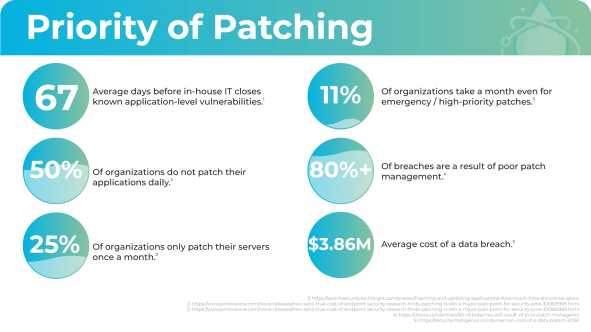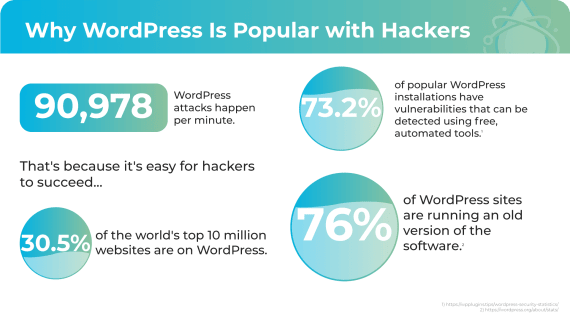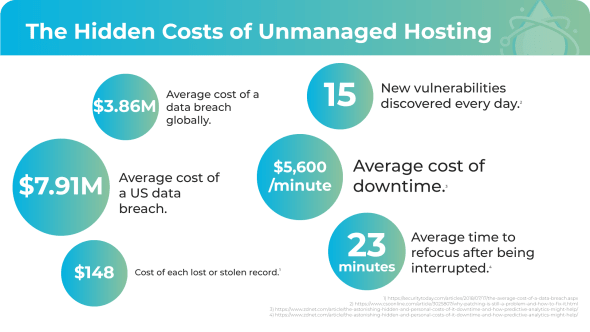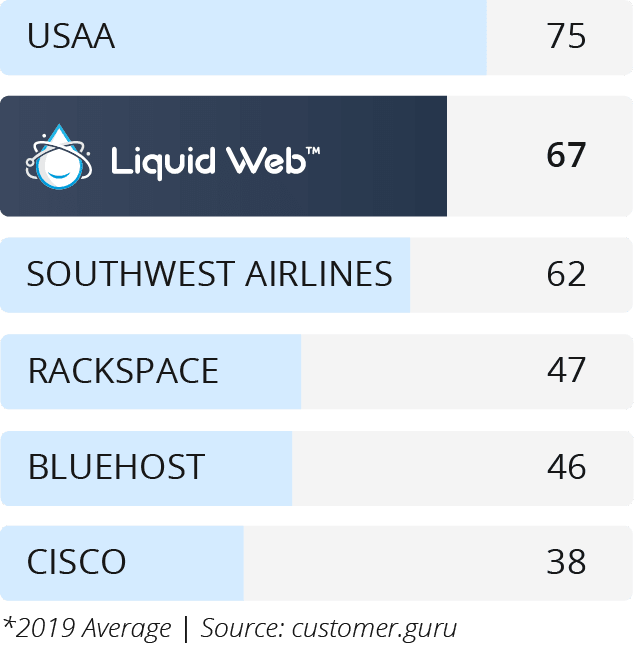The Definitive Guide to Managed Hosting
Every enterprise learns it sooner or later — the biggest competitive advantages sometimes come from unexpected places.
Offering a website or app that works smoothly around the globe? Advantage.
Implementing the latest technology a step ahead of your competitors? Advantage.
Keeping customer data secure and avoiding cybersecurity scandals? Big advantage.
This guide will show you exactly how choosing managed hosting can propel your enterprise ahead of the competition. We’ll cover:
What is Managed Hosting?
Managed hosting is when a hosting company handles the setup, administration, management, and support of a server and/or application. Management services vary from host to host but typically include OS updates and patching, 24/7/365 support, network infrastructure and hardware management, basic security measures including virus and spam protection, and monitoring and remediation of anything that could affect the performance of the server.
It’s the managed hosting company’s job to ensure their client’s websites and applications stay up and running at all times, and these guarantees are typically backed by a Service Level Agreement stating how the managed hosting company will compensate the client if something goes down.
In the same way that you work with contractors to scale more efficiently and effectively, you can outsource the management of your hosting to eliminate the need for in-house hosting infrastructure or experts.
We’ll talk about why that’s beneficial in a second, but first let’s answer the obvious question — why does your hosting need to be managed at all?
The Tradeoffs of Unmanaged Hosting
To really understand the benefits of managed hosting, it’s helpful to first understand the alternative.
With unmanaged hosting, you rent space on servers owned by the hosting company, but it’s largely a do-it-yourself experience. You get a server with the OS of your choice, and the hosting company is responsible for operating the equipment and maintaining the physical environment in which the servers are kept. You are responsible for administering the server remotely, and that includes responsibility of software upgrades, patching, security, and monitoring.

Unmanaged Hosting Gone Bad
The classic example of unmanaged hosting gone bad is that you get a call in the middle of the night saying your servers are down and none of your global customer base can access your website.
That’s a terrible scenario, and that’s why you hear it so often.
But there are so many other issues that can pop up:
Getting Hamstrung by a Slow-Loading Site
You notice your lead pipeline drop substantially, only to realize your site bounce rates are through the roof due to slow load times.
Becoming a Cybersecurity Cautionary Tale
You’re blindsided by a cyber exploit that would never have happened if you’d patched your software more consistently.
Crashing and Burning When Your Site Is Needed Most
You launch a new product that gets an enormous amount of press, but your site can’t handle the traffic, so it crashes.
Struggling to Find (and Budget for) IT Help
Some companies opt to hire someone in-house specifically to manage their hosting to avoid some of these scenarios. The problem is that not only is tech talent exceedingly hard to find right now in the midst of a historic skill gap, it’s expensive.
The median salary for an IT manager is $86,000, and it can be as high as $130,000 a year.1 You’ll pay a fraction of that if you choose to outsource to a managed hosting provider.
The Benefits of Managed Hosting
Choosing managed hosting allows you to avoid all those tradeoffs and gain some highly valuable benefits:
Reduce Risk
In today’s digital enterprise, reducing risk is not just the job of one department. In many ways, it’s the responsibility of everyone in the organization, from the employee choosing not to open a suspicious email to the accountant ensuring financial information is shared securely.
The thing is, people aren’t always perfect, and effectively reducing exposure to online risks is not an easy task. It takes a high level of oversight and constant maintenance on the back end to ensure:
- the OS is updated, and security patches are completed,
- cybersecurity threats are being identified and remediated, and
- good traffic is able to flow in while suspicious traffic is stopped at the gate.
Outsourcing this part of the job to a managed hosting provider is a great way to ensure it gets done correctly and consistently.
Keep Up with the Speed of Business
Business growth isn’t always linear. Sometimes scale happens rapidly, or can even come in waves with seasonal changes and market shifts.
Your managed hosting provider will work with you to adjust your hosting resources as needed to ensure your IT scales with your business. More importantly, as long as you maintain good communication with your managed hosting team, they can help you create a technology roadmap to support upcoming growth and product launches.
Stay Up to Date with Technology
Moore’s Law means that tech is getting better, faster, and more compact at an exponential rate. Not all companies will keep up with these changes, which means many will miss out on the efficiency and customer service benefits of emerging tech like IoT and machine learning / AI.
Working with a good managed hosting provider means you get access to the latest technology, without having to invest a lot of capital in it. And as advancements happen, your company will benefit from them, while your competitors struggle to catch up.
Stay Compliant
Companies that manage sensitive or highly regulated data, such as information covered by HIPAA or PCI regulations, have a slew of compliance requirements they have to meet on an ongoing basis — requirements that take ongoing time and attention to fulfill. Your managed hosting provider will take care of these tasks for you, freeing up time and headspace to focus on other things.
Get Affordable Access to Skilled Experts
Remember that skills gap? Hosting companies are able to attract a strong concentration of talented people who enjoy the challenge of serving multiple customers. Your managed hosting provider will invest in keeping those workers educated and up to date on the latest IT threats and opportunities. And with every problem they solve for another customer, they’re learning new and innovative ways to improve your IT as well. (As the Most Helpful Humans in Hosting®, we think this one is pretty important.)
Types of Managed Hosting Services
Fully Managed Hosting
Fully managed hosting is our top-of-the-line service for companies that want a higher-touch experience from the very beginning. It means we work closely with you to help choose the right hosting plan, and our experts architect your infrastructure for optimal success based on your business operations and goals.
We’ll also take care of migration and help with onboarding to limit any interruptions to your business as you get set up. Once you’re up and running, we provide round-the-clock management to ensure your infrastructure and applications are updated, secure, and running quickly for customers around the globe.
As technology changes and your business grows, we’ll even pro-actively suggest ways we can improve your hosting implementation to stay ahead of the curve.
Fully managed hosting includes:
- 24/7/365 support
- Fully managed network infrastructure
- Fully managed hardware
- Wholly owned Liquid Web data centers
- Level 3 technicians on-site 24/7/365
- System level health monitoring and graphing
- System level monitoring alerts and notifications
- 100% uptime SLA on these items
- Installation and full support of core software package
- Core operating system updates and patches
- Security enhancements
- Full web server support including Apache (Linux)
- Proactive response and restoration of monitoring events
- Virus and spam protection
- Free external migrations (restrictions apply)
- Full control panel support
- Control panel updates and patches
On top of this, we specialize in hosting the apps and platforms companies use most.
Managed WordPress Hosting
Anyone who runs a site on WordPress knows that it’s a great platform. WordPress offers a wide variety of templates, plugins, features, and tools that enable small and large businesses alike to build professional, functional websites.
That’s why 33% of the Internet runs on WordPress.
But as you may have noticed if you’ve ever run a WordPress site, failing to update one compromised plugin can take the whole site down. So can adding a plugin that isn’t optimized to work with your site.
And if you don’t know the tricks to set up secure WordPress hosting, you might also find yourself dealing with frequent hacking attempts. Around 91,000 WordPress attacks happen per minute, targeting sites of all sizes.

Signing up for Managed WordPress significantly reduces all of these concerns, as you know your site will be set up securely, monitored for suspicious activity, and updated regularly.
At Liquid Web, we automatically update plugins. As part of that service, we even make a copy of your site and test the plugin updates to ensure they won’t crash your site once they’re installed. We also perform daily backups, include an Image Optimization plugin to improve page-speed, and give you full access to the server and developer tools like SSH, Git, and WP-CLI. On top of that, we’ve optimized our platform for fast page load speeds using the latest technologies: PHP7, SSL, and Nginx.
Managed WooCommerce Hosting
Ecommerce is a booming industry that has forever changed the face of retail. And 22% of the top 1 million ecommerce sites are built on WooCommerce.
It’s a powerful platform that can be used to build and run ecommerce sites of all sizes. But using WooCommerce managed hosting turns it into a high-octane sales engine.
Stores that use Liquid Web managed WooCommerce hosting are 2-10 times faster than ones that don’t. The trick is that, while most hosts offer platforms that work great for cached WordPress sites, we understand that your online store can't be cached the same way. So we've created a platform specifically geared toward helping your store's load time.
We’ve also put a great deal of time into ensuring our WooCommerce managed offering sets you up for success from day one with free migration, abandoned cart and page builder plugins, tons of free themes, mobile optimization, and much more.
Premium Business Email Hosting
What business can operate without delivering reliable email access to employees wherever they go?
Many companies turn to Gmail for their business email needs because it has name recognition and checks most of the boxes for what companies need. But with Liquid Web, you can get fully managed email hosting with the features you love (Spam filtering, phone and chat included, 10k messages per day) plus 5 times as much storage per mailbox, all at ⅕ the price of Gmail.
We also offer long-term email archival so you don’t lose your precious data. We don’t currently offer email hosting as a one-off service, but if you use or are planning to use Liquid Web for other hosting services, our premium business email hosting is a no-brainer.
Managed Hosting vs. Other Options
So now you understand how managed hosting works and what it might look like. Now let’s compare the managed vs. unmanaged versions of some popular hosting options.
Managed Hosting vs. Public Cloud (e.g. AWS, Azure, Google Cloud)
If you have the time and expertise to secure and manage your own hosting 24/7, but don’t want to invest in servers, public cloud may be a good option for you.
But make no mistake — unmanaged public cloud hosting is DIY hosting. You’ll be responsible for monitoring your own traffic, setting up disaster recovery, running backups, configuring your firewall, tracking compliance, scaling and optimizing your resources as you grow, and of course, keeping your servers and software patched and up to date. In some cases, you will have a la carte options, but these come at a significant premium price point. Public cloud often isn’t the bargain price advertised once all ‘optional’ features are added.
Also, be aware that your data will be stored on a shared server with other companies’ data, making it more vulnerable to cyber attacks that may come in via your “neighbors’” networks, as well as occasional performance degradation due to those same “noisy neighbors” bogging down the host server resources.
There are many ways to do public cloud hosting right — they’re just time-consuming and require specialized knowledge. For the vast majority of businesses, managed cloud hosting is a more cost- and time-effective choice that also leads to better security and performance. In business, time is money. Would you rather spend your valuable time patching and updating servers, or applying that time to areas of your business that are revenue generating?
Managed Hosting vs. Private Cloud
Unmanaged Private cloud is a more secure alternative to unmanaged public cloud, as your data is hosted on private hardware instead of a shared environment. From there, you’ll be able to break up your server resources into individual virtual machines, making it possible to run separate apps on separate OSes within the same server, for example.
However, unless you opt for a fully managed private cloud, you’ll still be responsible for all of the monitoring and maintenance of a DIY hosting environment.
Managed Private cloud is a great option for companies who want higher-security, lower-risk infrastructure that is protected and optimized by experts for the ultimate performance.
Managed Hosting vs. Dedicated Hosting
Unmanaged Dedicated hosting means your data is hosted on its own individual server, eliminating some of the security concerns that come with shared hosting. But unless you opt for managed dedicated hosting, you miss out on 24/7 monitoring and support, patching and updates, and all of the other benefits of management.
Once again, it’s a question of how much time and expertise your team has. If you want to reduce risk and overhead, managed dedicated hosting is typically a better way to go than the unmanaged version.
Managed Hosting vs. VPS Hosting
Unmanaged VPS hosting environments mimic a dedicated server within a shared hosting environment, so it’s technically a combination of shared and dedicated hosting.
If you want your environment to run faster, smoother, and more securely with less overhead, managed VPS hosting is the way to go. Cloud Spectator, an independent, third-party cloud analytics firm, benchmarked Liquid Web’s managed cloud products, including managed VPS hosting, against Rackspace, AWS, and Digital Ocean and found Liquid Web’s server performance is up to 200% faster.
When you use our managed VPS hosting, you get free set up and management of Cloudflare content delivery network (CDN), enhanced security, built-in backups, and DDoS attack protection to keep your site or apps running at full steam.
If you have the time and expertise to secure and manage your own hosting 24/7, but don’t want to invest in servers, public cloud may be a good option for you.

Liquid Web's server performance is up to
200% Faster
than competitors' cloud products
Managed Hosting Pricing
One of the most common reasons people don’t look into managed hosting is they assume it’s expensive. On paper, it may look pricier than unmanaged hosting, but when you consider the hidden costs of leaving your infrastructure unmanaged, paying for management is a no-brainer.
General Comparison
Managed hosting prices range widely depending on the level of attention your infrastructure will receive and the level of expertise the hosting company offers.
As a rule, when you see ultra-low-cost managed web hosting being offered, it’s a sign that the host is either not using modern technology, not hiring knowledgeable staff, or both. For true, fully managed web hosting, expect to pay $150-250/mo or more depending on the type of hosting (Cloud VPS is the exception — it can cost much less even from reputable providers).
Managed applications, like WordPress or WooCommerce, are a different story, typically costing less than $50/mo. And for managed email, don’t pay more than $1-5/mo for a base plan.
If you’re comparing the cost of managed hosting to on-premise hosting, the savings are painfully obvious. Doing your own in-house hosting means paying for (and replacing/upgrading) servers, software, round-the-clock tech management, and significantly more electricity. Your managed hosting cost will be exponentially lower.
What may be less obvious is how managed hosting can save you money compared with unmanaged hosting from somewhere like AWS or Digital Ocean.
Hidden Costs of Unmanaged Hosting
At first glance, you might think, “I can get unmanaged hosting for just a few dollars a month. How can you say managed is a better deal?”
It’s important to look below the surface to account for the hidden costs of unmanaged hosting, including:
Breaches
The global average cost of a data breach has risen to $3.86 million. If you’re in the United States, that number goes up to $7.91 million. Moreover, each lost or stolen record costs you an average of $148. Mitigating security risk is probably the single most obvious reason to pay for managed hosting, as the savings can truly make or break your company.
Downtime
Using managed hosting significantly reduces the chance you’ll experience website or application downtime. The cost of IT downtime is $5,600/minute for the average company. That’s $300,000 in an hour. That means one instance of downtime that lasts only one minute will cost you almost twice as much as a year of high-end managed hosting.
Productivity
Beyond the time spent patching or responding to downtime and breaches, it’s important to account for how those tasks will affect your team’s productivity levels. Every time one of your team members gets interrupted, it can take around 23 minutes for them to refocus on their prior task.
Patching and Updates
Who is handling your patching and updates? Account for the time it will take them to stay on top of that responsibility, as well as server reboot time. Keep in mind that 5,000 to 6,000 new vulnerabilities surface each year, or an average of 15 per day. And patching doesn’t just involve clicking a button — your team will have to test and verify each patch to ensure the patch is good and that it has been applied to all of the company’s systems without breaking any functionality.

How to Choose a Managed Hosting Provider
One last thing — where you host matters.
Not all providers deliver the same managed hosting services or the same level of support. Do your due diligence to figure out which provider will give you the most reliable and robust hosting plan and will be a pro-active partner in your success, now and in the future.
Beyond checking managed hosting provider reviews, how do you make sure you get this decision right?
Here is a checklist of questions to ask.
| Company Stability | Has the company experienced growth in the last 12 months or conversely suffered a negative business event? Does the company have a strong, experienced executive leadership team? Does the company own its own data centers? Does the company use Tier 1 providers for network access? |
| Product Innovation | Does the company support a variety of hosting products and services that can meet the ever-changing needs of your projects? Have there been any new products developed in the last 12 months? Do the products include the most up-to-date security and performance software? How old is the hardware/software being used? Does a cheaper price mean that they utilize older or refurbished hardware? How compatible and flexible are the products? Do they work with a wide variety of plug-ins? Do they support a variety of operating systems and applications? |
| People That Can Help | Do customers have around-the-clock access to highly- trained, certified technicians? Can you talk live to someone about your issue same day? Are you given multiple methods of contact for support? Does the company charge for support? Do they own their own infrastructure and are they on-site with the servers 24x7x365? Do they have a team dedicated to helping you migrate data? Will they do it for free? What do current customers say about the customer service? Ask for data. |
| Promises | Does the company provide performance and customer service guarantees? What is their track record on uptime? What service level agreements are in place in the event of an outage? Does the company have flexible agreements and pricing or are you locked into contracts? Does the company have a high net-promoter or satisfaction score (do current customers recommended them)? |
Final Thoughts
Selecting the managed hosting plan that’s right for you doesn’t have to be a stressful undertaking. The Most Helpful Humans in Hosting® are here to guide you to the best decision and ensure the whole process goes smoothly, from planning and migration to long-term optimization and scaling.
With other hosting providers, you may get OS updates, monitoring, and security. But with Liquid Web, you’ll also get:
Better SLAs
We wouldn’t call ourselves The Most Helpful Humans in Hosting® if we weren’t ready to deliver on that promise. Our service-level agreement is among the best in the industry, with:
- 30-Minute Hardware Replacement Guarantee
- 100% Network Uptime Guarantee
- 59-Minute Initial Response Guarantee
And if we fail to meet our SLA commitments for any reason, we’ll give you a credit for 10 times (1,000%) the actual amount of time you were affected.
Deeper Bench of Expertise
You’re hiring us for our expertise, and that’s what you’ll get. We staff up our data centers with Level 3 technicians round-the-clock, so you have the best working for you at all times.
We’re also proud to have more than 250 Red Hat and Microsoft Windows Certified Administrators on our team, trained to make your hosting implementation run like a dream.
Pro-active Partnership for Long-Term Success
You may be outsourcing your technology to us, but we’ll quickly become part of the family. Our goal is not just to respond to your IT needs but to anticipate them and help you build digital transformation strategies that support your long-term goals and projects.
We love our customers, which is why they love us right back. Liquid Web is proud to be the highest-rated hosting company in the industry, with a leading net promoter score of 67.

Managed Hosting FAQs
Let's get acquainted.
We’re ready to be the only managed hosting provider you’ll ever need.
1-800-580-4985, Option 1


